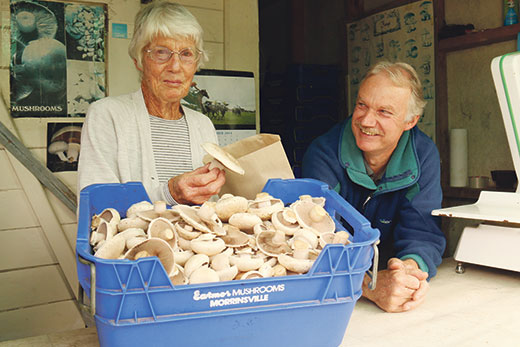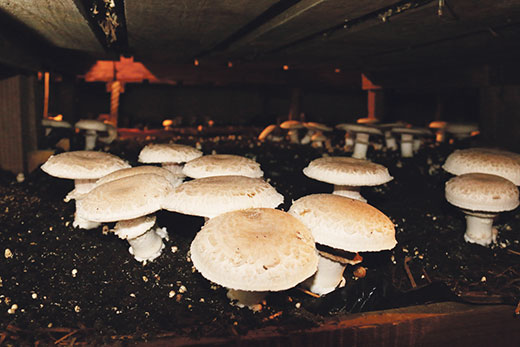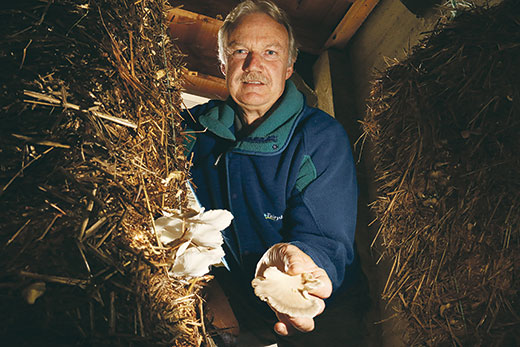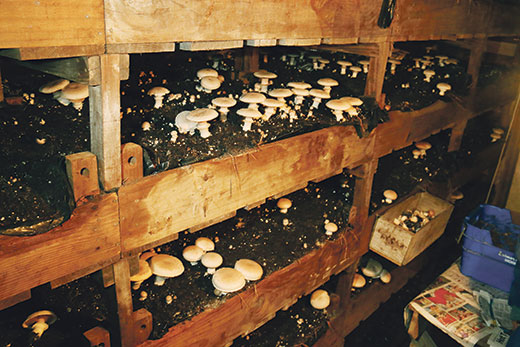The way delicate oyster mushrooms are cultivated at Te Puna’s Flavour Queen Mushrooms might be a world first.
Mushroom grower Geoff Oliver has been experimenting with growing the tasty fungi and thinks he’s onto a winning system, the exact details of which he’s understandably not about to make public.

Pat Oliver and her son Geoff take pride in their Mushrooms.
Family farms
Recently he’s also visited mushroom farms overseas seeking new ideas, only to find that farmers in Europe are “reverting” to the way the Oliver family have always grown mushrooms.
“The mushroom industry in Europe has gone through the kind of trends we’re seeing in New Zealand, starting from small family businesses, growing to very big operations, and now returning to small family businesses again.”
Pat, who at 82 still helps with harvesting and selling mushrooms, says quality control is much easier in a smaller operation.
Mushrooms can be tricky to grow and need careful handling at harvest to ensure the best quality product for customers, she says.
One international trend Geoff says is catching on in New Zealand is to use food as medicine in keeping with the saying of Hippocrates, the Greek physician referred to as the father of western medicine: “Let food be thy medicine and medicine be thy food”.

Medicinal benefits
“Asian cultures, Chinese in particular, have always used food as a medicine and the rest of the world is now beginning to think this way with people looking for foods with medicinal benefits,” says Geoff.
It’s for that reason the next species of mushrooms he grows commercially will be the reishi mushroom (Ganoderma lucidum) which is commonly called the ling-zhi in China.
One of the bracket fungi, it has been used in Chinese and Japanese folk medicine for at least 4000 years, for liver problems, hepatitis, hypertension, arthritis, insomnia, bronchitis, gastric ulcer and asthma.
Ling zhi, is also known as the ‘The Mushroom of Immortality’ and is used in cancer treatment in traditional and modern Chinese medicine.
It is said to improve vitality, strength and stamina and to prolong life and to enhance immune response, alleviate chemotherapy side effects such as nausea and kidney damage and protect cellular DNA by raising antioxidant capacity.
Scientists at the USA’s City of Hope research and treatment center for cancer, diabetes and other life-threatening diseases are reported to have found a potential link between mushrooms and a decreased likelihood of tumour growth and development in cells and animals.
City of Hope researchers now plan to apply this research to human clinical trials. Other researchers have found evidence extracts from certain mushrooms, in combination with other extracts, may play a role in breast cancer treatment.

Geoff Oliver believes the way he’s growing oyster mushrooms is a world first.
Nutritious food
However, making health claims for a natural product like mushrooms can’t be done without exhaustive scientific research and published findings.
Geoff says there’s no doubt though that mushrooms are a nutritious food; they are low in calories, fat-free, cholesterol-free, gluten-free, and very low in sodium, and provide important nutrients, including selenium, potassium, riboflavin, niacin, vitamin D and more.
Pat says she and Trevor became mushroom farmers almost by accident.
“Trevor was an electrical engineer and when we first lived here in Clark Rd, Te Puna, we were surrounded by farmland and in autumn could go out and pick wild mushrooms.”
As land use changed to orchards, the supply of mushrooms dwindled. “Trevor saw an advertisement in a magazine about an American company, which was selling mushroom spore so he had some shipped out.”
Absorbing hobby
The spores should have been kept refrigerated but they weren’t. However, some mushrooms did grow leading to an absorbing hobby for Trevor. It wasn’t long before Pat and Trevor decided growing mushrooms could become a business.
“Trevor built all the mushroom houses, which are air-conditioned to keep the temperature just right for the mushrooms.”
An innovative man with diverse technical and practical skills, Trevor designed systems to make running the business as simple as possible.
This included buying sets of railway tracks from the Waihi Goldmine along with bogies to run on them, and laying the tracks to allow heavy trays of compost to be moved to and from the mushroom houses.
He also bought a huge butter churn from a dairy factory to make and mix the compost; vital to the successful cultivation of mushrooms.
The most recent ingenious Oliver device is a mobile Marshall solid fuel hot water heater on a wheeled trolley, which produces stream to pasteurise the compost.
Geoff still imports mushroom spore for Flavour Queen Mushrooms and it arrives by air, not sea as did his father’s first shipment.
Farmers market
It takes about three weeks for pin-head sized mushrooms to emerge from their growing medium and these beds are “select picked” during several weeks.
For Geoff it’s a constant rotation of cleaning out used mushroom trays, preparing new ones with fresh compost and spores, caring for the fungi while they grow and harvesting the mushroom.
Then on Saturday morning he and Pat can be found at the Tauranga Farmer’s Market at the Tauranga Primary School, where their mushrooms sell out well before the market closes.
“It’s the part of the business I like the best because you get to meet and talk to customers, many of who have bought mushrooms from us for years.”
Geoff was among the founders of the market and he reckons it’s the ideal place for consumers to meet producers and ask about the food they are buying, how it’s produced, what’s great about it and how to cook and eat it.




0 Comments
Leave a Comment